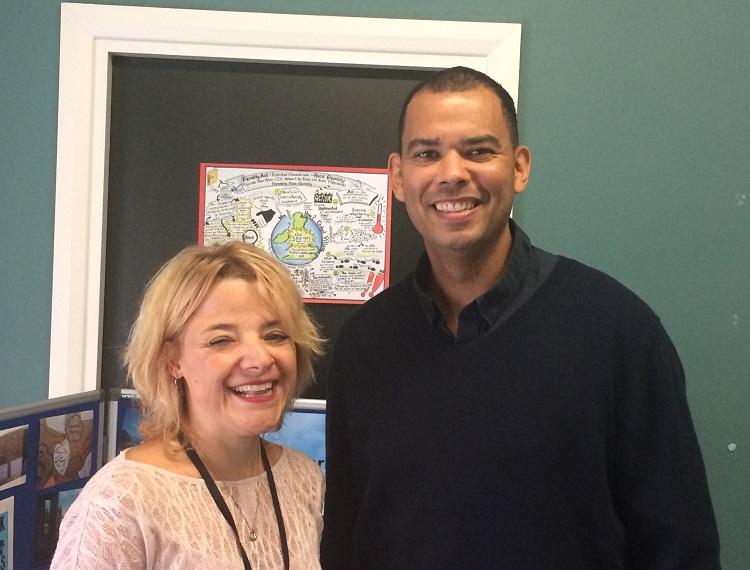PREVENT as an opportunity to ‘Educate out Hate’

“I now know how important it is in teaching to allow spaces for disagreement, exploration and uncertainty.” Project Participant
Earlier in 2016, as Brexit debates sank to new depths of intolerance, we travelled around England exploring Fundamental British Values (FBV) and Prevent[1] with teacher educators and trainees. This article explores our reflexive conclusions a few months after the project’s end.
According to Henry Giroux, education should be “…a formative culture which [produces] citizens who are…willing to act in a socially inclusive and responsible way.” We are depressingly far from that ideal in the UK today. Giroux would argue that our educational culture, “…[reduces] learning to an instrumental logic that too often and too easily can be perverted to violent ends.”
What began as an attempt to subvert an agenda which casts teachers as counter-surveillance officers ended as a real mission of praxis for us both. Everywhere we went, we found people hungry to think differently about the potential for democratic education. In a world of adult education that foregrounds ticking Ofsted boxes above all, there is little room for debate and discussion. We do not like uncertainty either; yet Prevent is an area for fear, confusion and misunderstanding, where people are scared to open up and spaces no longer feel safe. ‘Fundamental British Values’ appear sound yet can also be divisive.
We hope to convince you that more important than content in ‘teaching’ Prevent/FBV, is process. The cult of ‘embedding’ needs shifting to a movement of ‘pro-social pedagogy[2]’ where we model behaviour, enable thinking to happen, and explicitly create transformative spaces of belonging. This is possible wherever we gather people together for the process of learning, as long as we recognise the potential for all colleagues and students to be equal as thinkers. And of course it is not limited to classrooms, but also our social and workspaces.
Our project used Community Philosophy (CP)[3] to get people thinking, even (especially) when that meant disagreeing with one another.
Participants generated philosophical questions such as:
- What am I doing, to foster a sense of belonging and community in my classes?
- What does it actually mean, to be radical?
- How am I preparing my students to play a positive part in a globalised and diverse world?
- How am I enabling my students to express their views and respect the views of others?
The notion of ‘belonging’ arose repeatedly. Stimulated into affirmative/restorative (rather than negative/punitive) thinking, our 60+ participants may have disagreed about nuances of Prevent/FBV, but they reached a stable consensus about what we as educators can do to challenge alienation and extremism: foster a sense of ‘belonging’ within our own classrooms. Philosophical inquiries always conclude with a call to action and in the case of every session we ran this was a consideration of how to build community and identity, flipping the idea of ‘Prevent’ to the concept of ‘Enable’.
Participants committed to actions such as:
- Re-reading and critically analysing the original Government Prevent guidance.
- Following diverse voices on Twitter and joining campaigns.
- Researching Non-Violent Communication as a means of facilitating respectful debate.
- Doing identity and values work with their own groups.
- Using Restorative Practice approaches to build classroom communities.
As people who aim to work affirmatively and openly, Prevent/FBV has been a challenge for us. Using Community Philosophy to hear and explore diverse and oppositional views has been vital to our confidence in navigating these complex and nuanced waters. We have a duty as public servants to take Prevent/FBV seriously, but our biggest responsibility is to our own students who will be going out into the world needing clarity the chance to think all of this through.
A final thought: perhaps it is time to reclaim the word ‘radical’. As Paulo Freire said:
“[The radical person]…is not afraid to confront, to listen, to see the world unveiled…not afraid to meet the people or to enter into a dialogue with them. This person does not consider himself or herself …the liberator of the oppressed; but he or she does commit himself or herself, within history, to fight at their side.”
Karol Thornton and Kay Sidebottom, Tutor Voices
Evans, B. and Giroux. H.A. (2016). The Violence of Forgetting. New York Times. 20.6.2016.
Freire, P. (1972). Pedagogy of the Oppressed. London. Penguin.
Sidebottom, K. and Thornton, K. (2016) Final Report – Exploring Prevent and FBV through Philosophical Inquiry. Online
[1] Our project was funded by The Consortium for Education and Training. Educators across the sector have been uncertain of how to respond to the Prevent/FBV agenda as evidenced through discussions on social networks. Current approaches to Prevent training are largely online and focus on transmitting and testing information. This covers the bases in terms of organisations evidencing that staff are trained. It comes nowhere near addressing the concerns, fears and prejudices of educators, who, in the experience of our pilot, are left either further confused and bewildered, or hardened in pejorative assumptions.
[2] We use Restorative Practice, Thinking Environments, Community Philosophy, Open Space Technology, Non-Violent Communication – on and offline. Certainly there will be many others we haven’t heard of.
[3] CP is an inquiry-based learning technique which encourages questioning and critical thinking. Participants are encouraged to ‘problematise’ and question accepted concepts, connect ideas and use reflection and action to gain a critical awareness of social reality.












Responses